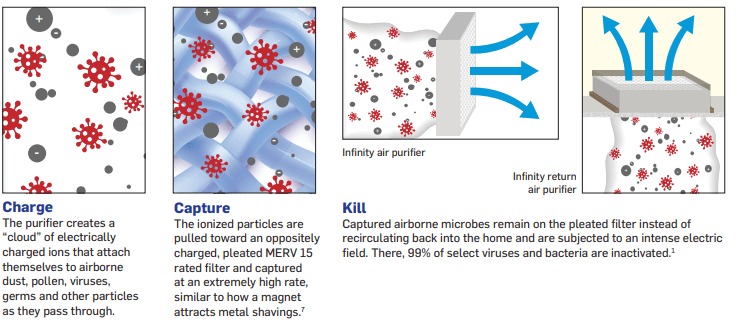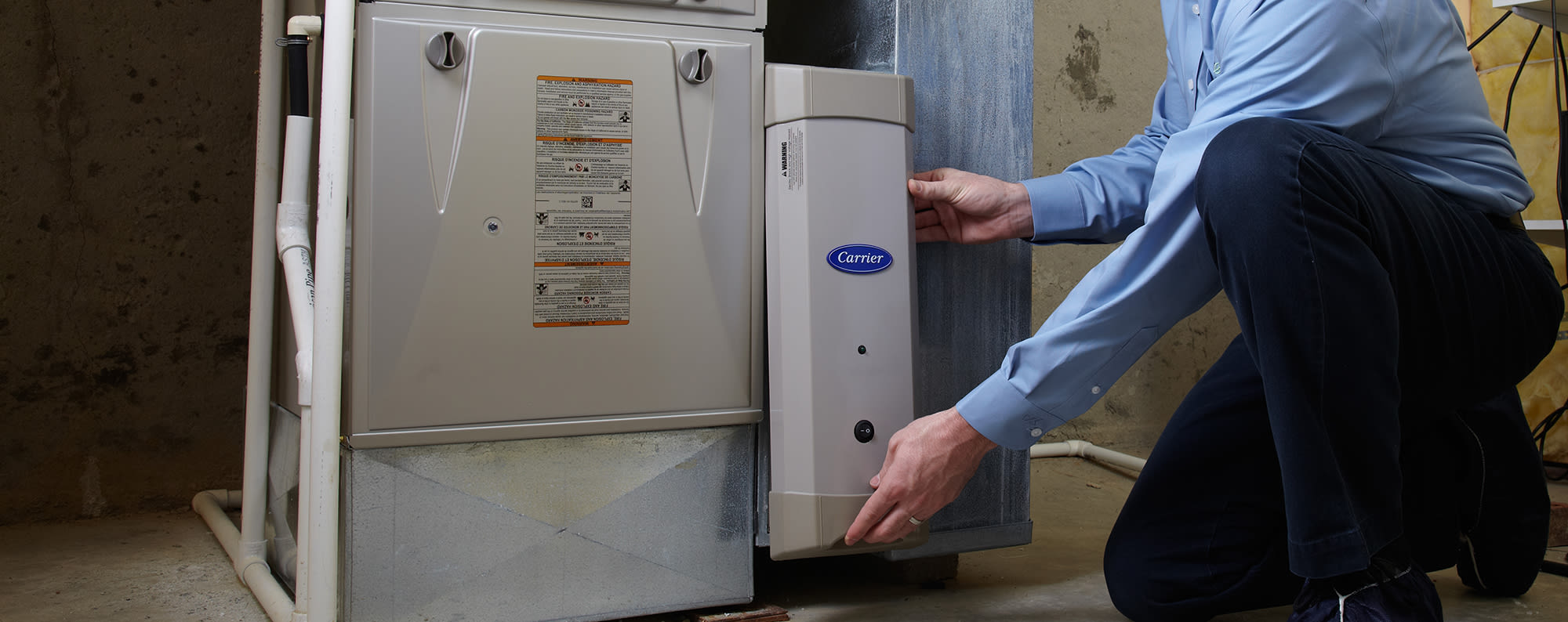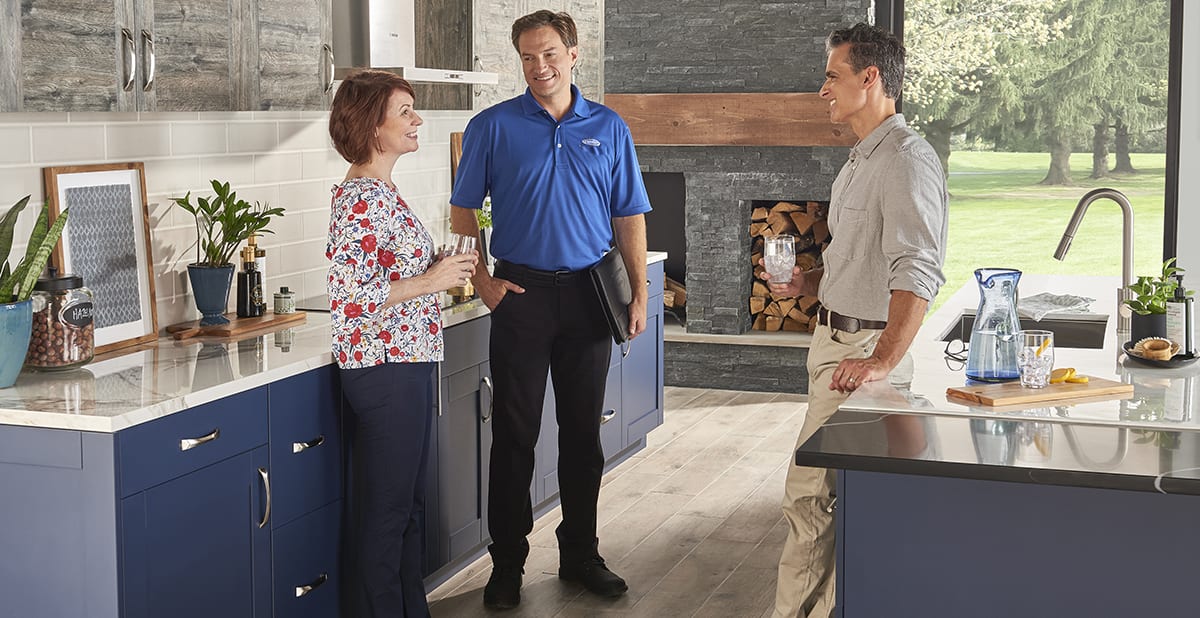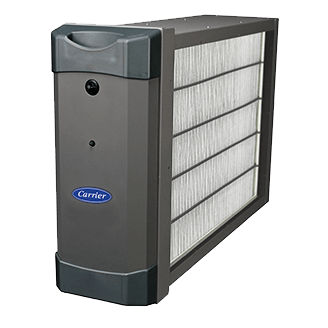Best Allergen Air Purifier
By Travis Baugh
Indoor air quality is getting a lot of attention these days, and for good reason. According to the EPA, levels of pollutants in indoor air can be two to five times higher than outdoor air.1 Unfortunately, inside exposure to pet dander, dust mites and other airborne particulate matter can trigger allergy and asthma symptoms. That’s why it’s important to follow a simple, three-step solution to improving the quality of the air in your home.2 These steps include:
- Removing, reducing or eliminating sources of airborne pollutants
- Ventilating living areas in your home using available kitchen or bathroom exhaust fans
- Adding air filters or air purifiers to help clean the air
So, when you think about researching or purchasing air purifiers for allergies, keep in mind that while air purifiers don’t treat allergies, they can be very effective at removing allergens like pet hair and dander, pollen, and dust. It’s also important to know that the most effective solution includes taking additional steps to protect yourself.
As the indoor comfort experts, Carrier offers a number of reliable solutions for improving indoor air quality, including our Infinity® air purifiers, featuring our patented Captures & Kills® technology, that offer proven, 99% inactivation of select captured viruses and germs.3

Do Air Purifiers Help With Allergies?
Answering the question, “do air purifiers help with allergies?” starts with understanding how air purifiers work. In most cases, an air purifier uses a fan to circulate air into a filter or series of air filters. Depending upon the capability of the filtration system, airborne particles of various sizes are trapped, leaving cleaner, or “purified” air back into the room or home. The effectiveness of the air purifier is directly related to the capability of the filter or filters. For example, a true HEPA filter has been verified to capture 99.97 percent of airborne pollutants sized 0.3 microns in diameter.
Other air cleaning and purifying units may use electronic methods of collecting airborne particles. These units place an electrical charge on incoming particles and capture the charged particles on oppositely charged collector plates or filters. These models often include a mechanical pre-filter which must be replaced regularly. If you still have questions regarding “do air purifiers work?”, check out our web page dedicated to that topic.
According to the American College of Allergy, Asthma and Immunology, air filtration has shown an ability to reduce airborne allergens.4 Regardless of how they do it, air purifiers can help trap allergens including dust mites, pet hair, pet dander, and smoke. Learn more about do air purifiers help with dust? While avoiding these pollutants altogether is the best solution, sometimes it’s not possible. You can, however, reduce exposure to airborne pollutants in your home by:
- Banning indoor smoking
- Reducing or minimizing use of fireplaces
- Turning on exhaust fan when cooking
- Replace carpeting with hardwood floors or other hard surfaces
- Removing cloth-covered furniture and replace with leather-covered furniture
- Minimizing or removing other “soft” surfaces like decorative pillows, stuffed animals, and throws
- Cleaning all heating and air conditioner filters as required
And when you have done all that you can to eliminate sources of airborne pollutants within your home, be sure to consider the air purifier options available through Carrier. Select Carrier air purifiers have HEPA (high efficiency particulate air) filters; and, some models offer several fan speed settings which allow you to adjust for more air circulation and filtering as needed, or quieter operation if preferred. Carrier has a complete lineup of whole-home air cleaners and purifiers in addition to our newer, portable Carrier at Home air purifier.

Questions to Ask Before Purchasing an Air Purifier for Allergens
Now that we’ve discussed the benefits of air purifiers for allergies and how air purifiers can help filter out allergens, let’s take a look at some questions you should ask before making a purchase. Some examples include:
- How often will the unit clean the air in my room/home? The answer will depend upon the size of the room or home (square feet) and the air purifier’s available fan speeds.
- What substances will the air purifier clean in my home? This will depend upon the type of filter or filtration system. True HEPA filters can capture 99.97% of dust, pollen, pet dander and other particles 0.3 microns or larger. For non-HEPA filters, check for the MERV rating – the higher the number, the more effective the filter and the more types of pollutants it can capture.
- How often does the filter need to be changed? As a general rule, many air purifier filters need to be replaced once every 6 – 12 months. However, this will depend upon the type of filter and the manufacturer’s recommendations.
- What air filtration system should the air purification system have to clean your home effectively? Some of the best air purifiers on the market include technologies that can either inactivate particles trapped in the filter or combine HEPA filtration with a prefilter of some kind and / or an adsorbent filter such as activated carbon which helps remove or reduce odors.
- What is the CADR (Clean Air Delivery Rate) of the air purifier? Portable room air purifiers have a CADR rating. This is a rating that was developed by the Association of Home Appliance Manufactures (AHAM) to measure the effectiveness of an air filter based upon room space, and the volume of clean air produced per minute. CADR ratings are recorded for the three most common indoor pollutants of dust, pollen and smoke.
- What air purifier is suited for smaller rooms / bigger rooms? Portable room air purifiers often include published recommendations for appropriate room size. For example, our room air purifiers are available in two sizes, one for moderately sized rooms and one for larger rooms. Whole-home air purifiers, like the Carrier Infinity air purifier are tied into your home’s HVAC system to provide air cleaning capabilities for the entire home.
What are Some Additional Ways To Battle Indoor Allergies?
- Maintain Proper Humidity: Use a humidifier to keep indoor humidity levels between 30-50%, reducing the likelihood of mold growth and alleviating respiratory issues.
- Improve Ventilation: Ensure proper airflow through the home, especially in large rooms, to help disperse air pollution and prevent the buildup of allergens.
- Vacuum Regularly: Vacuuming with a high-efficiency filter can help remove dust, pet dander, and other allergens that contribute to poor indoor air quality.
- Control Mold Growth: Prevent mold by addressing leaks promptly and using dehumidifiers in damp areas like basements.
- Choose Fragrance-Free Cleaning Products: Fragrances and harsh chemicals can trigger allergic reactions, so opt for mild, fragrance-free cleaners.
- Declutter Your Home: Reducing clutter helps prevent dust accumulation and makes it easier to keep your home clean and allergen-free.
Best Air Purifier for Allergies
If you find yourself asking what the best air purifier for allergies is, remember that air purifiers don’t treat allergies but instead filter out allergens that can cause allergy symptoms. You might consider air purifiers that are most effective at capturing the pollutants you and your family have sensitivities to. They also need to match your needs in terms of affordability and whether you prefer a whole-home solution or one that just focuses on one room.

Carrier offers three types of air purifiers or air cleaners:
Infinity Air Purifier: The Infinity air purifier is a whole-home solution that is added to your heating and cooling system. It not only captures dirt, pollen and pet dander, it inactivates 99% of select airborne germs and viruses trapped in the MERV 15 filter -- including coronavirus, human influenza, the common cold and bacteria that causes strep throat.3 The Infinity air purifier is our most advanced solution for the entire home, and it is our highest cost option as well.
ComfortTM EZ Flex Cabinet: The EZ Flex system is not considered to be an air purifier, but rather an air filter that does provide advanced, whole-home air filtration. EZ Flex uses a deep-pleated MERV 10 filter that keeps air flowing while removing 63% of airborne particles in micron size range 1.0 to 3.0.5 They can filter common household pollutants such as dust mites, pollen, skin flakes, and other allergens. This is our most affordable whole-home solution.
Room Air Purifier: Our smart room air purifiers offer the ultimate in flexibility and effectiveness. These portable units include three levels of filtration – a pre-filter that captures larger particles such as dust, dirt and pet dander; a HEPA filter that captures up to 99.97% of particles sized 0.3 microns and an activated carbon filter for odors and VOCs. These filters can trap dust, pollen and pet dander; and an activated carbon filter that helps remove odors. While this model offers effective filtration in one area of the home, it is not considered a whole-home solution.

You can learn more about our whole-home air purifiers, choosing the best air purifier for your home, and discover other indoor air quality products solutions.
1 https://www.epa.gov/report-environment/indoor-air-quality
2 https://www.epa.gov/indoor-air-quality-iaq/improving-indoor-air-quality
3 The Infinity air purifier has demonstrated effectiveness against the murine coronavirus, based on third-party testing (2020) showing a >99% inactivation, which is a virus similar to the human novel coronavirus (SARS-CoV-2) that causes COVID-19. Therefore, the Infinity air purifier can be expected to be effective against SARS-CoV-2 when used in accordance with its directions for use. Third-party testing (2012, 2007) also shows =99% inactivation for the type of virus that causes common colds, Streptococcus pyogenes and human influenza. Airborne particles must flow through your HVAC system and be trapped by the MERV 15 Infinity filter to be inactivated at 99%. The Infinity air purifier achieves a MERV 15 rating based on third-party testing (2012) showing 95% of particles size 1.0 to 3.0 microns captured and 85% of particles size 0.3 to 1.0 microns captured. Learn how it works.
4 https://acaai.org/allergies/management-treatment/living-with-allergies/air-filters/
5 Based on third party testing (2015) showing 63% of particles size 1.0 to 3.0 captured and 91% of particles size 3.0 to 10 captured.
FAQs About Best Air Purifiers For Allergies
Even when hiring a professional, many people have questions about ductless Mini split AC installation which may impact their decision-making when deciding whether ductless is the right answer. Here are some common questions:
Although air purifiers don’t directly treat allergies, they can help filter allergens that are known to cause allergies. Their filters can trap airborne allergens like dust, pollen, and pet dander, thus helping improve indoor air quality . Some air purifiers also include activated carbon filters to capture odors and chemical pollutants.
To choose an air purifier for allergies, look for a model that has either a MERV 15 filter or a HEPA filter. If selecting a room air purifier, consider the Clean Air Delivery Rate (CADR) to ensure it matches the room size. Additional features like activated carbon filters can help with odors and chemical pollutants. Check for certifications like AHAM or Energy Star for performance and efficiency. Noise level and maintenance costs, including filter replacements, are also important factors.
If replacing a filter for a whole-home air purifier, a MERV 15 filter like what’s found in the Infinity® Air Purifier is a great option. For room air purifiers, HEPA filters are a great option as they capture 99.97% of particles as small as 0.3 microns, including pollen, dust mites, and pet dander,. For added protection, look for air purifiers that also include activated carbon filters to remove odors or add a Carrier Carbon Air Purifier to your system.
To remove dust and allergens from the air, use a combination of methods:
- Air Purifiers: Add a whole-home air purifier with a MERV 15 filter or a room air purifier with a HEPA filter to capture particles as small as 0.3 microns, including dust, pollen, and pet dander.
- When using a whole home solution, turn the fan on continuous mode to aid in the reduction of contaminates. Note this may require more frequent filter changes and higher energy consumption.
- Vacuuming: Use a vacuum cleaner with a HEPA filter to trap dust and allergens from carpets and floors.
- Regular Cleaning: Dust surfaces frequently with a damp cloth to prevent particles from becoming airborne again.
- Reduce Clutter: Minimize items that collect dust, like curtains and stuffed toys, and wash bedding regularly in hot water.
- Ventilation: Ensure proper airflow and ventilation in your home to reduce indoor pollutants.
Yes, for optimal effectiveness, an air purifier should ideally run continuously, especially in areas where air quality concerns are significant, such as locations with high levels of pollutants. Running the air purifier constantly ensures that it consistently filters and cleans the air, maintaining a healthier indoor environment. However, consider energy costs and noise levels when deciding whether to run it continuously or intermittently, adjusting based on your specific needs and the purifier's capacity.
Explore Carrier Air Purifiers
Choosing a Carrier air purifier offers superior air filtration with advanced technology designed to capture a wide range of airborne pollutants, including allergens, dust, and viruses. Our air purifiers ensure cleaner, healthier air for your home, providing peace of mind and improving indoor air quality. With a trusted brand reputation, Carrier air purifiers are built to deliver long-lasting performance. Explore Carrier's line of air purifiers today.



